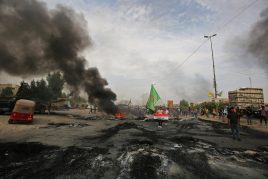MIDDLE EAST
Protests continue in Iraq where at least 44 people were killed yesterday in clashes that broke out between demonstrators and security forces in Nassiriya and Najaf. A bloodbath that led the Chaldean Patriarch of Baghdad, Card. Louis Raphael Sako, to send yet another appeal for dialogue: “Stop the violence and repression. The government and protesters should come together to reach an agreement.”

At least 44 people were killed yesterday in clashes between demonstrators and security forces in southern Iraq. Security sources reported that at least 33 people died in Nassiriya, the capital of the province of Dhi Qar, while another 11 died in the Shiite holy city of Najaf, where the previous day the Iranian Consulate was set on fire. This clearly shows that the growing Iranian presence and influence in the country’s politics – headed by Shiite Prime Minister Adel Abdul Mahdi – is increasingly badly perceived by Iraqis. The death toll since the beginning of anti-government protests last October is estimated at around 400 dead with 15,000 wounded.
 “The repressive measures against protesters are mounting steadily,” said the Chaldean Patriarch of Baghdad, Card. Louis Raphael Sako – it’ s time to put an end to violence and repression. Government and protesters should come together to reach an agreement, a compromise solution that protects people’s lives and the country’s future. We are extremely worried”, the Patriarch reiterated. “If all involved parties continue holding on to their positions the country will find itself in a dead end which it will be extremely difficult to exit from.”
“The repressive measures against protesters are mounting steadily,” said the Chaldean Patriarch of Baghdad, Card. Louis Raphael Sako – it’ s time to put an end to violence and repression. Government and protesters should come together to reach an agreement, a compromise solution that protects people’s lives and the country’s future. We are extremely worried”, the Patriarch reiterated. “If all involved parties continue holding on to their positions the country will find itself in a dead end which it will be extremely difficult to exit from.”
A stalemate that Iraq seems to have fallen into since 2003, with the invasion by the US and the international coalition and the collapse of Saddam Hussein’s regime…
Iraq has been paying the price of corruption, misgovernment of the sectarian and confessional political class for 16 years, since 2003. Each of these groups always sought their particular interest rather than the good of the country. Political parties have money and militias while a large number of people have nothing and live in poverty.
Yesterday people died and were wounded in Nassiriya and Najaf. The government seems to have chosen the path of repression, why?
The protesters demand reforms, rights, work, services, they want justice, the end of corruption.
The government is unable to meet the demands of the demonstrators.
But dialogue is the only possible option. The method of military repression chosen by the government does not solve the problem, rather it complicates it, sparking off revenge. There is a strong mentality of revenge in these countries, because of the tribal system. If someone is killed, the members of the victim’s tribe will try to retaliate. Mutual trust between demonstrators and the government is necessary but it’s hard to recreate it in this situation.
After the bloodbath in Nassiriya, the Governor of the Province resigned and distanced himself from the repression. In order to investigate the facts, the Supreme Judicial Council of Iraq created a Commission of Inquiry…
Setting up inquiry committees is not enough to convince people. There have been many since 2003, with no results. There is no justice. I contacted Nassiriya last night to express our solidarity. We will send assistance to the families of the victims, to support them at this difficult time.
On the subject of dialogue: is there room for mediation and who could be the mediator? Just a few days ago you mentioned the creation of a common crisis unit to stop the bloodshed and start building a strong State…
We have always encouraged dialogue and encounter as a privileged way to obtain justice, to establish the rule of law where everyone is a citizen with equal rights and duties.
We proposed identifying a group of wise men, recognised by all, who could at the same time put an end to the protests and repression, and guide the country through a period of transition, thereby preparing the grounds for necessary and urgent reforms, which is what the people want. But our voices were unheard because the government is not free. It is subjected to great pressure.
On 2 November last you were in Tahrir Square, Baghdad, to salute the protesters. They are colouring the walls of the cities with thousands of post-its on which protesters write their dreams and their requests. Do you think that those requests will eventually be answered?
We embrace and share the dreams of the Iraqis. I am very impressed by their desire to see the birth of a free, strong, stable, secure country, where progress, justice, equality and citizenship are the distinguishing traits. Young people are the richness of our country.
Never since 2003 have we seen protests like these, free from the constraints of sectarianism and confessionalism, where the protesters gathered together and embraced their national Iraqi identity which has been rediscovered. I believe that we are facing a historic turning point for our country. We are close to these young people and every day we pray for them and for the whole of Iraq. We pray that the Government will listen to their requests.
Are you planning to return to Tahrir Square?
Not for the time being. Not for security reasons but because my presence could be misinterpreted. I will be visiting the wounded civilians and soldiers and their families in the hospital. As Church we pray that our land, the land of Abraham, may once again become the land of peace, love and brotherhood, especially next year, marking the first centenary of Iraq’s independence.